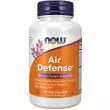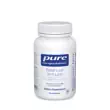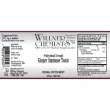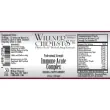4 Essential Vitamins to Boost Your Immune System Effectively

Key Takeaways
Vital vitamins for immune support:- Vitamin C: A potent antioxidant essential for immune defense.
- Vitamin B6: Supports the production of white blood cells.
- Vitamin D: Modulates immune responses and fights infections.
- Vitamin E: Enhances antibody production and cell protection.
Article by Arnie Gitomer Feb 5, 2024
Do you ever catch yourself wondering how to strengthen your immune system naturally? Enhancing your body's disease-fighting capability and resilience against health threats may seem like a herculean task. Still, often, the solution lies in some nutrient-rich corner of your kitchen or your nearest trusted store like Willner Chemists.
As custodians of good health, we often see our customers wrestling with a dual challenge: understanding the realm of nutritional supplements and finding reliable ones. In this pursuit, vitamins emerge as invisible heroes, playing a crucial role in fortifying our bodies, and today, we're here to discuss 4 vitamins that boost immune system defenses effectively.
Beneath the umbrella term 'vitamins' lies a world of distinct elements, each with unique benefits and sources. Harmony between these vitamins can significantly bolster your immune system, ensuring it's ready to ward off infections and diseases. So, what essential nutrients hold the key to a robust immune system? Let's dive into vitamins C, B6, D, and E!
Quick Glimpse of the 4 Essential Immune-Boosting Vitamins:
- Vitamin C - The Powerful Immune Booster
- Vitamin B6 - The White Blood Cell Producer
- Vitamin D - The Infection Fighter
- Vitamin E - The Antibody Enhancer
Vitamin C: The Powerful Immune Booster
As we dive into our list of the '4 vitamins to boost the immune system', Vitamin C undoubtedly takes the lead. Known as the powerhouse of immune-boosting vitamins, its role in supporting and bolstering our immune health is unparalleled. Vitamin C is an antioxidant, protecting our body from harmful substances that cause inflammation. This antioxidant property not only shields our body from everyday wear and tear but also helps combat disease-causing pathogens.
Sources of Vitamin C
As we often emphasize at Willner Chemists, Vitamin C is not produced by our body. This makes it essential to include Vitamin C-rich foods in our diet daily. While orange citrus fruits are the most commonly associated source of Vitamin C, it is also abundant in various other fruits and vegetables. Consider incorporating foods such as bell peppers, kiwi, strawberries, and papaya into your diet for a robust Vitamin C intake.
Recommended Daily Intake of Vitamin C
Ensuring an adequate daily intake of Vitamin C is crucial for maintaining optimal immune function. While the exact requirement may vary based on age, gender, and overall health, on average, adult men are recommended to consume 90mg of Vitamin C daily, and adult women 75mg daily.
Risks of Vitamin C Deficiency
Vitamin C deficiency can weaken immune function, making you more susceptible to infections, including the common cold and flu. In severe cases, it can result in scurvy, a disease characterized by anemia, bleeding gums, and skin problems. To avoid this, ensure a regular intake of Vitamin C-rich foods or supplements.
We offer a range of Vitamin C supplements at Willner Chemists and can guide you on the optimal dosage based on your unique needs. However, we always recommend consulting a healthcare provider before starting any new supplement regimen. This is crucial in ensuring the best possible outcomes for your immune health and overall well-being.
Now, let's move on to the next vital vitamin on our list - Vitamin B6.
Vitamin B6: The White Blood Cell Producer
Vitamin B6, also known as pyridoxine, is pivotal in bolstering your immune system. It is primarily responsible for supporting biochemical reactions in the immune system, particularly in producing white blood cells and T-cells. These are the cells that take the front line in your body’s defense mechanism, responding to fight off invaders like viruses and bacteria.
Food Sources Rich in Vitamin B6
You can find Vitamin B6 in a variety of foods. Here are some excellent sources:
- Fish, such as salmon and tuna
- Lean chicken breast
- Garbanzo beans (Chickpeas)
- Green vegetables, like spinach and broccoli
- Bananas
- Whole grains and cereals
- Potatoes and other starchy vegetables
Remember that a well-balanced diet is key. Incorporating these B6-rich foods into your meals can strengthen your immune system.
Recommended Daily Intake of Vitamin B6
The recommended daily intake of Vitamin B6 varies by age and sex, but for most adults, the daily intake ranges from 1.3 to 1.7 milligrams. While it's essential to meet this requirement, excessive intake can lead to nerve damage.
Risks of Vitamin B6 Deficiency
Vitamin B6 deficiency is relatively rare but can compromise the immune system and may even impact your body's ability to produce sufficient hemoglobin, leading to anemia. Symptoms of a B6 deficiency can include changes in mood, such as irritability or depression, as well as confusion and weakened immune function.
In conclusion, Vitamin B6 is an essential nutrient for immune health, playing a significant role in producing cells that fight off illness. To ensure you get enough of this vitamin, consider incorporating more B6-rich foods into your diet. As always, we at Willner Chemists recommend consulting with a healthcare provider to determine the best dietary and supplement regimen for your unique needs.
Next, let's uncover the benefits of Vitamin D, another key player in immune health.
Vitamin D: The Infection Fighter
Often referred to as the "sunshine vitamin," Vitamin D plays multiple roles in maintaining our health, including enhancing our body's immune response.
How Vitamin D Boosts Immune Health
Vitamin D is known for its ability to modulate innate and adaptive immune responses. This means it has the power to activate our body's natural defenses when a pathogen is detected and adapt to fight off specific recognized invaders more effectively.
According to the National Institutes of Health, Vitamin D can lower viral replication rates, suppress inflammation, and increase the levels and activity of T-regulatory cells, a type of white blood cell that helps keep our immune response in check.
Vitamin D deficiency has been associated with an increased risk of influenza and other respiratory tract infections. This highlights the importance of maintaining adequate levels of this vitamin, especially during the winter months when sunlight exposure is limited.
Sources of Vitamin D and the Importance of Sunlight
Vitamin D is unique among vitamins as your body can produce it when your skin is exposed to sunlight. This is why it's often referred to as the "sunshine vitamin." However, getting enough sunlight can be challenging during winter or for those living in northern latitudes.
In addition to sunlight, Vitamin D can also be obtained from certain foods like fatty fish, beef liver, cheese, and egg yolks. Many foods, like milk and cereals, are also fortified with Vitamin D.
Recommended Daily Intake of Vitamin D
The recommended daily intake of Vitamin D varies by age, but adults aged 19–70 should aim for 600 international units (IU) per day, while those over 70 should get 800 IU.
Vitamin D is fat-soluble, which means your body can store it for long periods. Therefore, it's important not to exceed the upper limit of 4,000 IU a day for adults, as it may lead to toxicity.
While most people in the U.S. have adequate Vitamin D status, dietary surveys indicate that many still consume less than the recommended amounts. That's where we come in. At Willner Chemists, we offer a range of Vitamin D supplements to help you meet your daily intake.
Risks of Vitamin D Deficiency
Low levels of Vitamin D can increase your risk of infections and affect bone health, as this vitamin plays a vital role in calcium absorption. A prolonged deficiency can lead to bone diseases like osteoporosis or rickets in children.
In conclusion, Vitamin D is one of the critical '4 vitamins to boost the immune system'. It's an infection fighter that helps our body fend off viruses and bacteria, highlighting the importance of maintaining adequate levels for overall health and well-being.
Vitamin E: The Antibody Enhancer
Moving on to the next vital vitamin, let's explore how Vitamin E contributes to our immune health.
Role of Vitamin E in Enhancing Antibody Production and Natural Killer Cell Activity
Vitamin E is a powerful antioxidant that plays a significant role in boosting our immune function. It enhances the production of antibodies, which are proteins that help our body fight off infections. Additionally, Vitamin E stimulates the activity of natural killer cells, a type of white blood cell that attacks and kills cancer cells and virus-infected cells in the body.
Studies have shown that Vitamin E deficiency can impair humoral and cell-mediated immunity, reducing natural killer cell activity and increasing susceptibility to infections. However, if administered for 1 to 8 months, high-dose Vitamin E supplements could enhance lymphocyte proliferation, interleukin-2 production, and natural killer cell activity.
Food Sources Rich in Vitamin E
For a healthy immune system, it's important to incorporate food sources rich in Vitamin E into our daily diet. Foods high in Vitamin E include wheat germ oil, sunflower seeds, almonds, hazelnuts, and peanut butter.
Recommended Daily Intake of Vitamin E
Like other vitamins, the recommended daily intake of Vitamin E varies based on age and sex. However, adults typically need about 15 milligrams of Vitamin E per day.
Risks of Vitamin E Deficiency
Though rare, Vitamin E deficiency can occur in people with intestinal malabsorption disorders. Deficiency symptoms may include nerve and muscle damage, vision problems, and a weakened immune system. Therefore, it's crucial to maintain adequate Vitamin E levels in our body.
While Vitamin E supplements can boost immunity, it's always best to consult a healthcare provider before starting any supplement regimen, especially at high doses. At Willner Chemists, we can guide you on the best Vitamin E supplements suited to your needs.
In conclusion, Vitamin E is an essential part of our '4 vitamins to boost immune system' list, playing a critical role in enhancing antibody production and natural killer cell activity.
The Role of Hydration and Diet in Immune Health
Taking vitamins alone isn't enough to boost your immune system. Staying hydrated and maintaining a healthy diet is also vital. Let's take a closer look at these two crucial components.
Staying Hydrated for Immune Health
Water is your body's lifeblood, and staying hydrated should be a top priority. Hydration is essential for overall health, including a well-functioning immune system. It helps your body flush out toxins, circulate nutrients, and maintain a healthy digestive system that can absorb nutrients more effectively, including those all-important vitamins.
We can't overstate the importance of drinking enough water daily. While the amount varies depending on your body size, activity level, and climate, a good starting point is aiming for eight 8-ounce glasses, which equals about 2 liters or half a gallon.
Eating a Rainbow of Fruits and Vegetables
Along with your '4 vitamins to boost immune system' focus, a balanced diet rich in colorful fruits and vegetables is a game-changer for your immune health. These foods are packed with vitamins, antioxidants, and fiber that your body needs to stay healthy.
According to the Cleveland Clinic, you can't just eat a bunch of oranges one day and expect to be protected against catching a cold all season. Building a strong immune system requires consistent, healthy eating habits over time.
Here at Willner Chemists, we recommend a diet high in fruits and vegetables, aiming for five to seven servings daily. This will provide a high-fiber diet that is beneficial for your gastrointestinal tract and ensure you're getting a wide range of vitamins and antioxidants needed for a robust immune system.
In conclusion, hydration and a nutritious diet are just as important as taking vitamins to boost your immune system. So, drink plenty of water and eat a rainbow of fruits and vegetables to keep your immune system in shape.
In the next section, we'll wrap things up with a recap of the 4 essential vitamins for boosting the immune system and some final thoughts.
Conclusion
In our journey to understand the 4 essential vitamins to boost the immune system, we've discussed the roles and benefits of Vitamins C, B6, D, and E. Each of these vitamins plays a critical role in strengthening our immune system, from producing white blood cells to fighting infections and enhancing antibody production.
Vitamin C is a powerful antioxidant that helps stimulate the production of white blood cells. At the same time, Vitamin B6 is crucial for the production of critical components of the immune system, such as T-cells. Vitamin D helps reduce the risk of respiratory infections, and Vitamin E enhances antibody production and fortifies our cells against damage.
However, it's important to remember that while these vitamins significantly boost our immune system, they're not a cure-all and should not be considered a substitute for a balanced diet, adequate sleep, and regular exercise. They're part of a larger puzzle of maintaining a healthy lifestyle.
Before starting any supplement regimen, it's essential to consult with a healthcare provider. This is particularly important because some supplements can interact with prescription or over-the-counter medications. At Willner Chemists, we believe in providing high-quality nutritional supplements, but we also believe in personalized guidance and expert advice to ensure you make the best decisions for your health.
In conclusion, the journey to a robust immune system isn't about a single miracle pill. It's about your overall health and well-being. It's about making conscious choices every day to fuel your body with the right nutrients, keep it moving, and give it the rest it needs.
A well-functioning immune system is your best defense against infections and diseases. We hope this guide serves as a helpful starting point in your journey to boosting your immune health. For more information about immune-boosting supplements, vitamins, or other health-related topics, browse our blog or shop online for our curated selection of products.
Stay healthy, stay strong; your health is in your hands!
 |
Read more about Arnie Gitomer |
Product Search Results

|
Air Defense Immune Booster | Now Foods | $14.99 | 52447 |

|
Balanced Immune | Pure Encapsulations | Login for Willner pricing. $65.00 | 69515 |

|
Ginger Immune Tonic | Willner Phyto Tech | $10.99 | 57012 |

|
Immune Acute Cmp vCap | Willner Phyto Tech | $14.14 | 67470 |

|
Immune Acute Complex | Willner Phyto Tech | $10.78 | 57728 |
